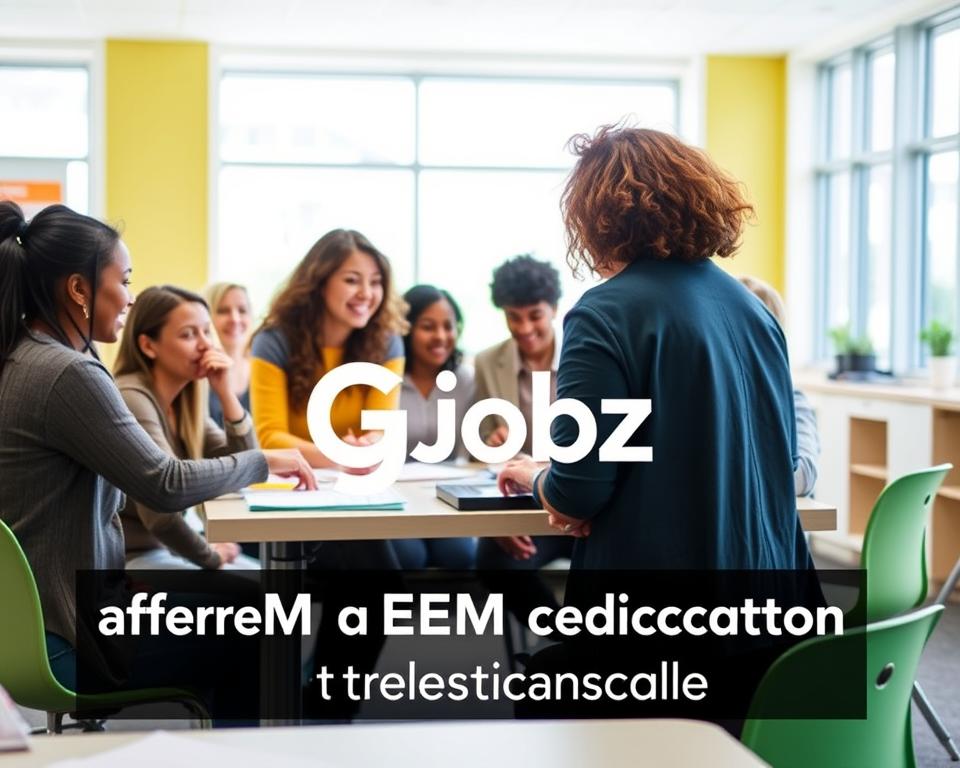
Low-cost certifications for educator professional development
Did you know that 58% of teachers say budget constraints stop them from advancing their careers? Many schools lack funding for training, leaving educators to find their own solutions. The good news? High-quality learning options exist without breaking the bank.
Programs like Harvard’s CS50 offer free STEM courses, with optional certificates for under $200. National Board Certification, a respected credential, costs $475 per component. These opportunities help teachers meet state requirements and boost student success.
Advancing your career shouldn’t mean financial stress. With the right resources, you can gain new skills, increase your salary, and even step into leadership roles. Let’s explore how to make it happen.
Key Takeaways
- Many teachers face budget barriers when seeking career growth.
- Affordable programs like Harvard’s CS50 provide flexible learning.
- Certifications can lead to higher pay and leadership opportunities.
- Options exist for under $200, making advancement accessible.
- Improved skills directly benefit classroom outcomes.
Why Professional Development Certifications Matter for Teachers
84% of school districts now tie license renewals to continuing education—are you prepared? Staying current isn’t just about compliance; it’s about delivering better student outcomes. Credentials validate your expertise and open doors to leadership roles.
The Growing Importance of Continuous Learning
Classrooms evolve rapidly. New tech tools and teaching strategies emerge yearly. States like Texas require 150 credit hours every five years, while others mandate 10–30 annual hours.
Podcasts like Fullmind Learning Can’t Wait offer free CTLE credits accepted in 41 states. Hybrid programs, such as ISTE’s 40-hour certification, blend flexibility with rigor.
How Credentials Demonstrate Expertise
Schools prioritize educators with verified skills. For example, National Board Certification correlates with higher student achievement. Unlike traditional graduate courses, $25 micro-credentials from Model Teaching provide focused training.
Meeting State Requirements Affordably
Budget constraints shouldn’t block growth. Compare costs:
- University courses: $1,000+ per credit
- 40 Hour Teacher Workweek: 104 credits for $175/year
- TCEA’s Texas-specific programs: $349
Scholarships and bulk discounts make these options accessible. Investing in learning pays off—for your career and your students.
Budget-Friendly General Teaching Certifications
Teachers often juggle tight budgets while seeking ways to grow their skills—here’s how to do it affordably. From component-based payments to free podcast credits, these options fit diverse needs and timelines.
National Board Certification
The National Board Certification splits costs into four manageable components at $475 each. Instead of paying $1,900 upfront, teachers can space payments over 1–3 years. Research shows NBCT-credentialed educators boost student outcomes by 1–2 months of additional learning annually.
Fullmind Learning Can’t Wait Podcast
Earn free credits by listening and submitting reflections. Approved in 41 states, this podcast covers trends like trauma-informed teaching. No fees—just instant CTLE hours for busy educators.
40 Hour Teacher Workweek
This membership includes an AI literacy course ($29/3 months) and graduate credit options. Compared to university courses, it’s 90% cheaper. Key features:
- 104 annual credits for $175
- Flexible online access
- Focus on time-saving strategies
For broader credentials, TCEA’s Campus Technology Specialist program offers 33 CPE hours for $349. Districts can save more with STEM.org’s bulk rate of $159 per teacher (1,000+ enrollments).
Low-Cost Technology Integration Certifications
Tech skills transform classrooms—here’s how to build them affordably. Schools increasingly rely on digital tools, making these credentials essential for modern teaching. Options range from $10 exams to portfolio-based programs.

Google Certified Educator Levels I & II
At just $10–$25 per exam, Google’s program covers core Workspace tools: Docs, Classroom, and Meet. Level I focuses on basics like organizing assignments, while Level II dives into advanced analytics. Exams take under 3 hours and include real-world scenarios.
ISTE Certification
*ISTE Certification* stands out with its 10-week, portfolio-based approach. Scholarships cover up to 50% of the $1,500 fee, and completers earn 4 graduate credits. The program emphasizes digital citizenship and AI integration strategies.
TCEA Campus Technology Specialist
For $349, TCEA offers a self-paced program with 33 CPE hours. Unlike ISTE’s live sessions, this focuses on LMS management and troubleshooting. Districts save more with bulk pricing.
Additional options like *Mastery Coding’s* $49.95 AI Essentials course provide niche skills. Compared to university programs costing $1,000+, these deliver similar outcomes at a fraction of the price.
- Key competencies: AI integration, digital literacy, data analysis
- Time commitment: 10 hours (Google) to 10 weeks (ISTE)
- Cost savings: Up to 90% vs. traditional grad courses
Affordable STEM Educator Certifications
STEM education is reshaping modern classrooms—here’s how to stay ahead without overspending. Schools prioritize hands-on science and tech skills, but budgets often limit access. These programs bridge the gap with flexible, low-cost options.

STEM.org Certified™ Educational Instructor
At $159 per teacher (bulk rate), STEM.org offers 24 CEUs and gamified learning strategies for K-12. Their approach turns complex concepts like robotics into interactive challenges. Key features:
- Aligns with Next Generation Science Standards (NGSS)
- Includes 3D printing and coding lesson plans
- District-wide discounts for 1,000+ enrollments
Harvard’s CS50: Introduction to Computer Science
This 12-week course covers C, Python, SQL, and JavaScript—all free to audit. Pay $199 only if you need a verified certificate. Teachers report spending 6–18 hours weekly, making it ideal for summer upskilling.
Supplement with EdWeb’s free STEM webinars to reinforce content. Together, these resources create a robust pipeline for engaging students in tech-driven lessons.
Professional Development for Classroom Management
Effective classroom strategies can transform student engagement—without draining your budget. Affordable courses and resources equip teachers with practical tools to address behavior challenges and boost learning outcomes.

Model Teaching’s Behavior Management Course
For $25, Model Teaching’s course delivers a 5-step framework for behavior intervention. It covers trauma-informed approaches and positive behavior support systems (PBIS). Teachers gain scripts and templates to implement immediately.
SimpleK12’s Gamification Strategies
SimpleK12’s $199/year membership includes 1,500+ on-demand videos. Topics range from engagement techniques to tech-integrated lessons. Compared to PBIS, their gamification methods focus on rewards and interactive teaching.
Additional budget-friendly options:
- Udemy: $13.99 courses on conflict resolution.
- Alison: Free SEN Teaching Strategies certification.
- Grassroots Workshops: $45 mini-courses on restorative practices.
Whether addressing disruptions or fostering inclusivity, these programs offer actionable strategies at accessible prices.
Free Micro-Credentials for Educators
Micro-credentials are changing how teachers access professional growth—without spending a dime. Platforms now offer verified badges and certificates to meet state requirements or explore new skills. From live webinars to self-paced online courses, these options fit busy schedules.

EdWeb’s Webinar Certificates
EdWeb hosts 1,500+ live and recorded sessions on topics like STEM and SEL. Their state eligibility map shows which webinars count toward credit in your region. Key features:
- Free certificates with attendance verification
- Archived sessions for flexible learning
- Partnerships with 41 state education agencies
Alison’s Diploma Programs
Alison offers fully free diplomas, like Educational Psychology and ESL Teaching Strategies. Courses include interactive assessments and downloadable resources. Unlike paid programs, Alison’s model is ad-supported but requires no fees for completion.
For niche topics, compare platforms:
- Coursera: Free audits (pay $49 for certificates)
- Open University: 1,000+ free modules (no credit)
Google’s Teacher Center provides free training on tools like Classroom and Meet. Class Central aggregates 100+ PD courses from universities like Illinois, including Negotiating Differences—a 20-hour program with a badge.
University-Affiliated PD at Reduced Costs
Top universities now offer flexible learning options at a fraction of traditional costs. These programs combine academic rigor with real-world applicability, perfect for educators balancing work and growth.

Harvard’s CS50 via edX
Harvard’s CS50 Introduction to Computer Science is free to audit on edX. For a verified certificate, pay just $199. The course covers Python, SQL, and JavaScript—essential for modern classrooms.
“CS50’s project-based approach helped me integrate coding into my math lessons seamlessly.” —Middle School Teacher, Texas
edX offers financial aid, reducing costs by up to 90%. Competency-based grading ensures mastery before advancement.
University of Illinois’ Negotiating Learner Differences
This 15-hour course explores inclusive teaching strategies. Earn a badge for $49 or audit free. Key features:
- Case studies on cultural responsiveness
- Self-paced modules with peer feedback
- Aligned with ISTE standards
| Program | Cost | Credit Options |
|---|---|---|
| CS50 (Harvard) | $199 | 3 CEUs |
| Illinois Course | $49 | 1 Graduate Credit |
| ASU Continuing Ed | $25/credit hour | State-approved |
Additional resources like MIT OpenCourseWare provide free STEM materials. Coursera’s Teaching SEL specialization ($49/month) builds social-emotional skills.
State-Specific Affordable Certification Options
State-specific learning options help teachers meet local standards while staying budget-conscious. Programs like Professional Learning Board (PLB) and TCEA customize content to align with regional mandates.

Professional Learning Board Packages
PLB offers bundled courses for state recertification. Their 10-hour packs cover topics like ELL strategies and ADHD support, approved in 30+ states. Key features:
- Flexible pacing: Complete modules in 30-minute increments
- District discounts for 50+ enrollments
- Immediate certificate issuance
TCEA’s Texas-Focused Programs
For Texas educators, TCEA’s $349 package includes 33 CPE hours aligned with TEKS standards. It focuses on:
- STEM integration
- Data privacy compliance
- Blended learning models
Regional cost comparisons reveal stark differences:
| Region | Average Cost | Credit Hours |
|---|---|---|
| Northeast | $220 | 15 |
| Southern States | $175 | 20 |
| Canada (Grassroots) | $45 CAD | 5 |
Specialized options like Back to Basics serve Tri-State areas with trauma-informed courses. Always verify approvals with your school district.
Maximizing Your PD Budget
Smart budgeting unlocks more learning opportunities for teachers. Strategic planning helps schools and individuals stretch funds further while meeting state requirements.
Bulk Enrollment Discounts
Group rates significantly reduce training costs. STEM.org offers a bulk rate of $159 per teacher—saving $43 per certificate for 1,000+ enrollments.
Negotiate similar deals for Google Certifications or 40 Hour Teacher Workweek memberships. Districts pooling resources can access premium programs at 50–70% off.
Free Trial Periods
Many platforms provide free access to test their content. SimpleK12’s 30-day trial includes 1,500+ videos, while Coursera lets you audit courses before paying for certificates.
Use trials to evaluate relevance before committing funds. This ensures alignment with school goals and personal growth needs.
District Reimbursement Programs
Title II funding covers PD expenses in most states. Urban districts often reimburse 100%, while rural areas may cap amounts. Key steps:
- Submit proof of completion and receipts.
- Leverage ESSER funds before 2024 deadlines.
- Explore “Grow Your Own” grants for state-specific support.
Educators can also claim up to $250 in tax deductions for unreimbursed training costs. Every dollar saved fuels more development opportunities.
Conclusion: Investing in Your Growth Without Breaking the Bank
Building your career in education doesn’t require massive student debt. Targeted credentials, like Mastery Coding’s $49.95 AI course, deliver focused skills at 90% less than traditional degrees.
Stackable programs let teachers build expertise gradually. Emerging trends, like microschool training, offer new pathways. Start small with free podcast credits—68% of districts now accept them for license renewal.
The right growth strategy balances cost and impact. Whether through university partnerships or state-approved courses, affordable options exist. Your next step? Explore one resource today.